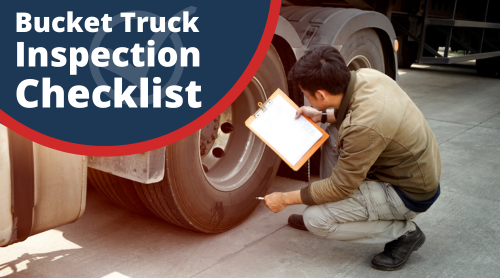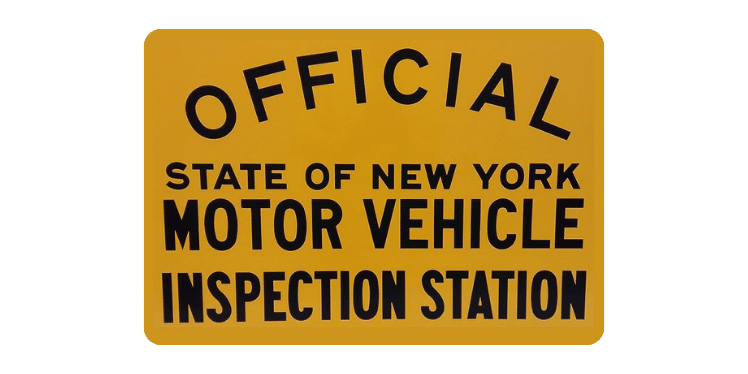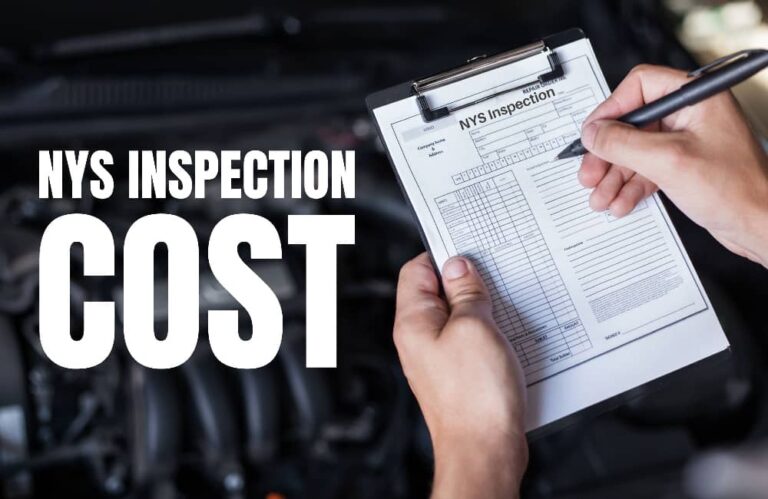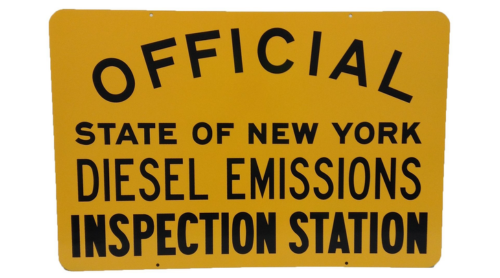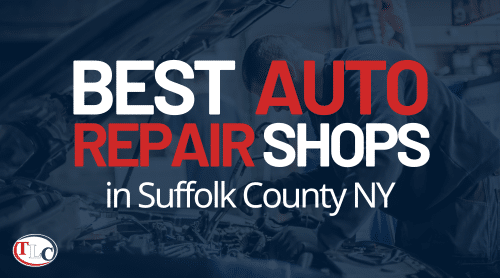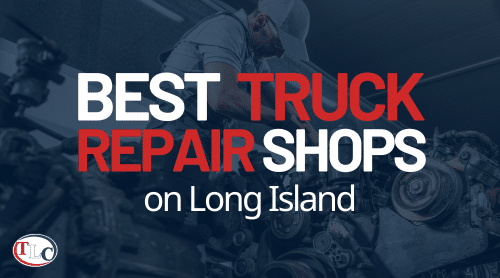What Is a Bucket Truck?
A bucket truck is a type of MEWP (mobile elevating work platform) used in various industries. These trucks come in several styles and forms, from telescopic bucket trucks to non-over center and even insulated bucket trucks. Each truck type requires extensive safety checks to ensure they function at peak capacity and lower the chance of injury or damage to the driver, workers, or truck itself during operation.
Bucket trucks are used in many utility positions, allowing workers to transport themselves and key items to the worksite without issue. Bucket trucks also include a bucket or lift portion that allows workers to reach higher elevations. These trucks often see use for powerline repairs (in the case of an insulated bucket truck) or branch clearing (often telescopic bucket trucks).
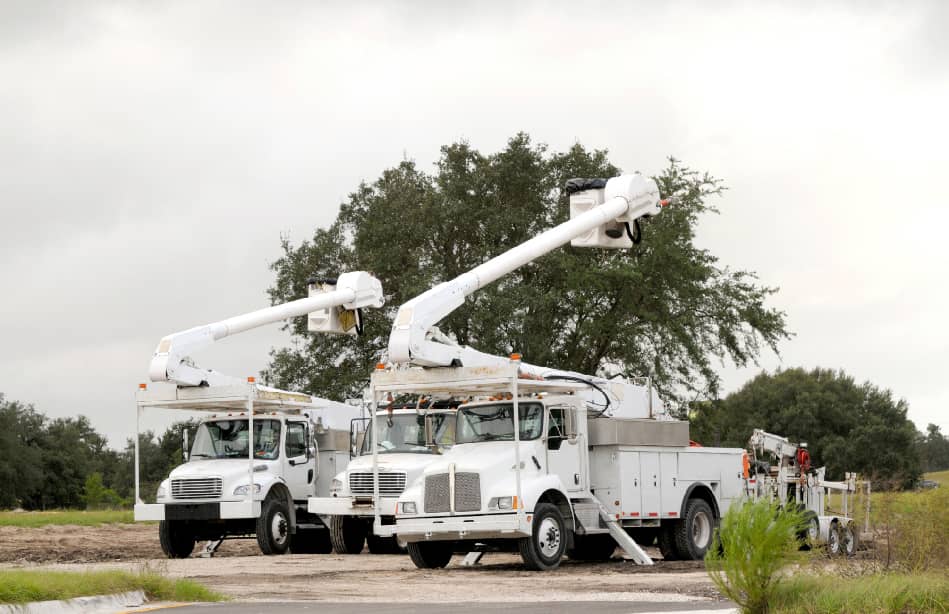
Because bucket trucks are specialized equipment, these vehicles require several maintenance and safety checks on their different components to ensure overall safety. Here, we discuss the daily, periodic, and yearly maintenance checks needed to own and operate a bucket truck or cherry picker safely and a downloadable safety checklist for daily bucket truck inspections.
Types of Bucket Trucks and Their Importance
There are several types of bucket trucks and other trucks that fall into the MEWP category and are quite similar to bucket trucks. All of these trucks require daily, routine, and yearly inspections, so it’s important to know their function and the purpose of each vehicle.
- Telescopic Bucket Trucks: These bucket trucks have telescoping boom apparatuses for an easily customizable height. This also allows the bucket to reach higher platforms and work positions easily.
- Articulating Telescopic Bucket Trucks: You can think of an articulating telescoping bucket truck like a normal bucket truck, except it has a larger range of movement thanks to a knuckle-like device on the boom that allows for freer movement.
- Overcenter & Non-Overcenter Bucket Trucks: These types of bucket trucks are divided based on how their boom sits. If the boom is over the truck’s center, it’s an overcenter bucket truck. However, if the boom sits further back or forward on the truck, it’s a non-overcenter bucket truck. An overcenter bucket truck offers more reach, while a non-overcenter bucket truck allows 180 degrees of movement from the boom.
- Material Handler Bucket Trucks: These bucket trucks can carry passengers and moderate loads, making them ideal for transporting materials to a worksite while still providing the same functionality as a standard bucket truck.
- Track Bucket Trucks: Have you ever seen the treads on a CAT machine? Track bucket trucks use tread instead of tires, allowing them to reach uneven locations easier than standard bucket trucks.
- Insulated Bucket Trucks: These trucks feature dielectric materials to reduce the possibility of electrocution. They’re often used in electrical work when combined with a cage on the bucket or other electrical protection device.
- Crane Truck: These trucks have a crane instead of a bucket and usually have a flatbed to load and unload materials. They’re technically in the same family as bucket trucks and similar heavy machinery, though they lack a bucket.
- Utility Truck: A utility truck is a workplace truck similar to a bucket truck without a telescoping boom and bucket. These durable trucks are commonplace across many different workplaces.
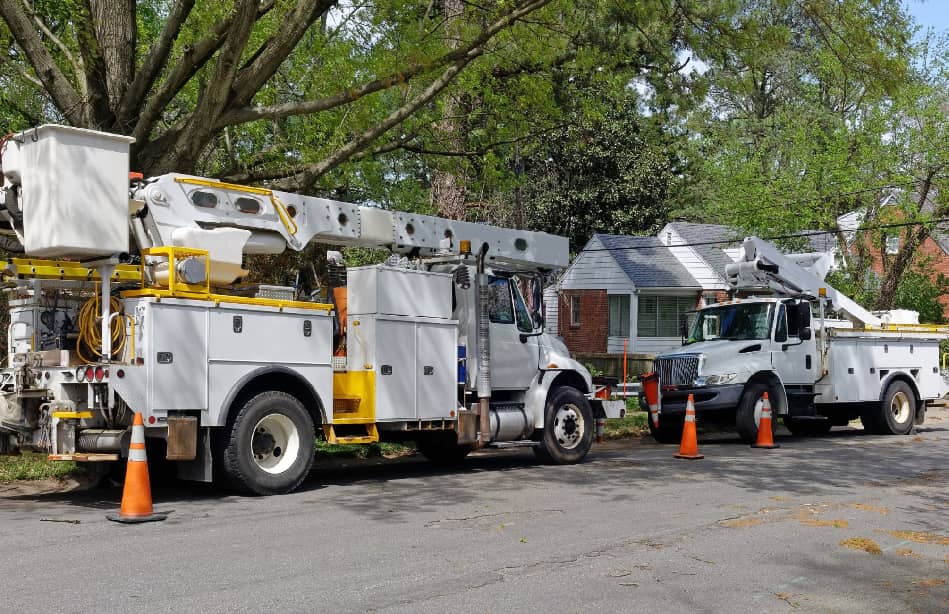
Importance of Bucket Truck Inspection
Bucket trucks are specialized pieces of heavy machinery. Not only do they require training to operate properly, but they should undergo daily, weekly, routine, and yearly inspections and safety checks to ensure proper operation. Because these large pieces of machinery carry heavy loads and move workers, when they fail it can have catastrophic repercussions.
This is why the American National Standards Institute (ANSI) has specific guidelines backed by the Occupational Safety and Health Administration (OSHA) that bucket truck owners must follow.
When Is a Bucket Truck Inspection Needed?
You should inspect your bucket truck at several different points during use. Daily inspections are crucial for catching issues before they become catastrophes. Weekly inspections allow for a closer look at the truck after significant use. According to ANSI/SIA Standards A92. 5 and A92. 6 section 6.6(2), bucket truck inspections are required at least after 150 hours of use or three months, whichever is shorter.
Another requirement from ANSI and OSHA is the yearly inspection of bucket trucks. As noted in ANSI regulations:
“Owners shall ensure an annual inspection is performed no later than thirteen (13) months from the date of the prior annual inspection. The inspection shall be performed by a person qualified to inspect the specific make and model of MEWP. The inspection shall include all items included in the frequent inspection plus items specified by the manufacturer for an annual inspection, to include manufacturer's bulletins. The inspection shall verify that the MEWP is registered with the MEWP manufacturer and that any open safety-related bulletins are addressed as part of the inspection. The MEWP shall not be placed back into service until all malfunctions and problems identified in the inspection have been corrected.”
What Are the Mandatory Tests Needed during a Bucket Truck Inspection
Both regulatory and recommended tests are required for bucket truck owners and operators. The required tests include yearly and the 150 hours or three months of work inspection noted by ANSI. However, it is recommended that bucket trucks undergo daily and weekly inspections to ensure there are no issues present and that everything functions correctly. This is the best way to ensure the equipment’s overall safety and ensure no repairs are necessary before operation. All bucket trucks must be repaired before resuming operation.
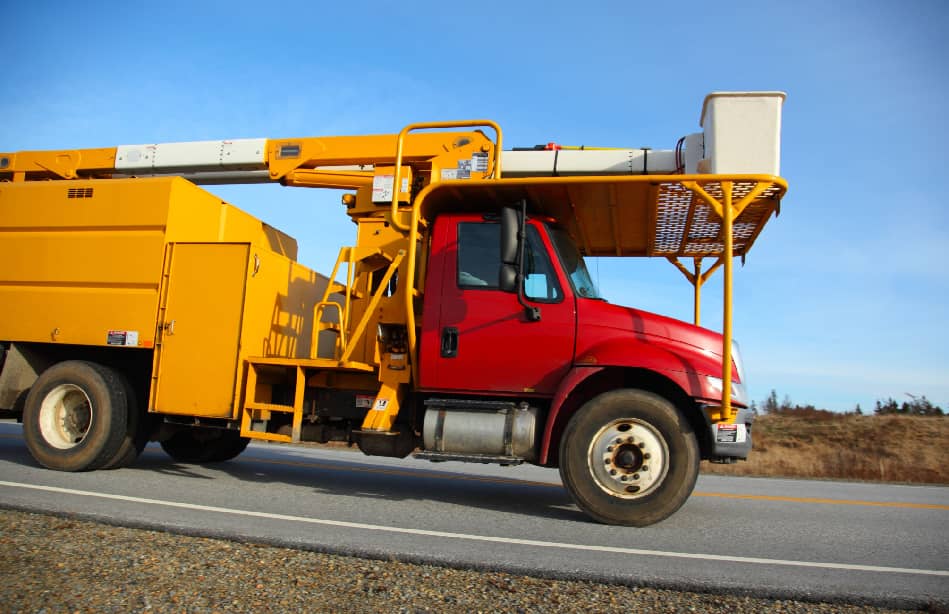
Types of Bucket Truck Inspection
Visual Inspection
A visual inspection done by a worker or truck owner includes checking the vehicle’s exterior for any obvious signs of damage. This can also include checking various safety features. A great example of a visual check routine comes from Plumas County in California, which recommends checking the following before each use:
- Tire pressure
- Lights
- Beacons
- Vehicle fluid levels
- Outriggers and pads
- Emergency brake
- Leveling system
- Hydraulic lubrication
- Pin retainers
- Structural and mechanical integrity
- Communications equipment
- Jib boom and other material handling
- Boom and boom rest
- Electrical circuits, including ground fault interrupters, start-stop, and auxiliary circuits
- Controls are plainly marked to their function
- Test lift controls
- Traffic cones stored
- Warning signs and flags stored
- First aid kit stored
- Fire extinguisher present
- Emergency rescue equipment checked and on board
- All necessary tools are present
NYS INSPECTIONS ON LONG ISLAND
Schedule your New York State Inspection with us Today!
Operational Tests
Operational tests include testing all mechanical and electrical systems on the bucket truck. This includes moving the bucket, checking brakes, lights, alarms, and control panels, and ensuring the vehicle runs properly. This is all part of the yearly ANSI inspection as well. However, checking these things daily is important to ensure no issues on the worksite or during transport.
Examples of structural tests include:
- Electrical components tests
- Safety devices test
- Functional and operational test
Functional Tests
Functional tests include checking the operating capacity of the bucket truck under operation conditions. This includes testing weight-bearing capacity, how well the vehicle moves under a standard and heavy load, and double-checking the performance of emergency systems. By ensuring these systems function correctly, you not only stave off issues on the worksite but also prevent potential disasters by catching issues early on.
Specialized Tests
There are many specialized tests that come into play during a yearly inspection or when checking a specific make of bucket truck. For example, technicians check the dielectric material capacity during a yearly ANSI inspection to ensure there’s no unexpected degradation to the materials and that everything functions correctly. They will also check the hydraulic systems for peak performance and signs of issues or failure.
Some other specialized tests carried out during yearly inspections include:
- Acoustic Emission (AE) Test: Made to test fiberglass and steel, this test employs 1 ½ to 2 times the recommended limit ont he boom. By using a sensitive sound system, this test notes any defects caused by the increased load.
- Magnetic Particle Inspection: This test tests welds and uses magnetic particles to spot surface cracks on ferrous materials.
- Dye Penetrant Inspection: Much like a magnetic particle inspection, a dye penetrant inspection checks for surface cracks in non-ferrous materials.
- Ultrasonic Inspection: This test uses ultrasound to find flaws in pins that are not easily accessible and which have flat ends with no drilled holes.
- Torque Testing: This test checks critical fasteners, including the upper and lower rotation bearing, boom connections, platform mounting, and swinging gearbox.
While doing these tests on a daily or weekly basis is not required by ANSI or OSHA, keeping an eye on these crucial failure points on your bucket truck can be beneficial to the longterm health of your vehicle.

Benefits of Using a Checklist
Using a checklist has several benefits. Not only does it ensure that you don’t miss a crucial step, but it allows for a standardized inspection process. No matter how well your workers know the inspection steps, having a checklist helps reduce the chance of human error. It also allows you to have proof of daily inspection steps, knowing when each inspection occurred and what was found.
Daily checklists help ensure your team’s safety, as they provide concrete proof of routine inspections and leave a paper trail if any error needs fixing before a truck leaves for the day. Never deploy a truck with outstanding issues, as this violates ANSI and OSHA safety guidelines. Any truck with damage or outstanding issues needs repair before deployment, and failure to do so is a safety risk and a workplace hazard.
Bucket Truck Pre-Use Checklist
Our bucket truck pre-use checklist allows you to easily print and save your checklist for daily use. Not only does it include everything you need for a visual and operational check, but it’s convenient format makes referencing past checks easier than ever. If you’re looking for a great way to streamline your daily precheck process, download this checklist.
We’ve even included blank spaces to help you add your own inspection steps to the checklist, like parking steps, cleanliness standards, belt wear, and more. This not only helps you track your vehicle’s overall appearance but provides a record of general upkeep which is useful for record-keeping and general upkeep around the shop.
Where Can I Get A Bucket Truck Inspection?
TLC Auto & Truck offers ANSI bucket truck inspection appointments. Our qualified technicians check everything, from general operations and functionality to specialized equipment needs like dielectric material testing and hydraulic functions. If you’re looking for top-of-the-line bucket truck servicing, inspections, and more, you’ve come to the right place. No matter the type of bucket truck, we provide comprehensive yearly inspections and can repair any issues we find on-site, streamlining the process for you and your team.
NYS INSPECTIONS ON LONG ISLAND
Schedule your New York State Inspection with us Today!
Conclusion
Remember, regular inspections are a crucial part of maintaining and operating any heavy machinery, including bucket trucks. By routinely checking the healthy and safety of your equipment, you’re preventing disaster and protecting your workers. Be sure to implement routine daily checks using a checklist for better record keeping, as well as overall peace of mind on the quality of your equipment.
You may as well like this article: ANSI Inspections for Bucket Trucks

